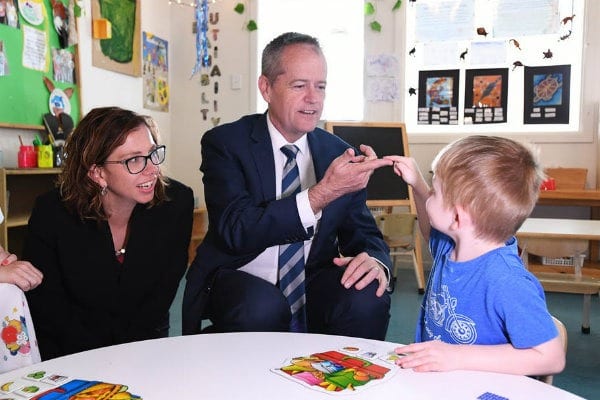With education an election battleground, Shorten is linking a new initiative on early childhood learning to the opposition’s broader schools policy, in which Labor is promising to out-spend the Coalition.
Shorten will also pledge to extend the present program for four-year-olds accessing preschooling, for which funding currently expires at the end of next year.
The ALP policy would create “a quality, two year program that boosts development in the most important years of a child’s development – an investment of an additional $1.75 billion into early education,” Labor says in its announcement.
It would mean that about 700,00 children a year would be able to access subsidised preschooling.
“We’ve got to stop viewing investing in our kids as a cost.” We speak to Opposition Leader @billshortenmp about Labor’s new preschool plan, how it’s being paid for and a potential image makeover. #auspol #TheProjectTV pic.twitter.com/fwOOtXm4O0
— The Project (@theprojecttv) October 4, 2018
In a speech at Monash University – extracts of which were released ahead – Shorten says that “under Labor, two years of preschool and kindergarten will be funded as the fourth pillar of our education system, taking their rightful place alongside schools, TAFE and university.
“This is an economic and social reform as profound as lifting the school leaving age and opening up universal access to universities,” he says.
“This reform will see two years of early childhood education permanently embedded into our education system, in recognition of the importance of the early years of a child’s life.”
Labor says that it has been shown that children who receive good early education do better in their later schooling. “Early education is particularly vital in closing the disadvantage gap before a child starts school.” The United Kingdom, New Zealand, France, Ireland and China have extended their early childhood education to include three-year-olds.
Labor says it would work with states and territories to deliver the program, including in setting enrolment and attendance targets, particularly for Indigenous and vulnerable children.
Michelle Grattan, Professorial Fellow, University of Canberra
This article is republished from The Conversation under a Creative Commons license. Read the original article.


